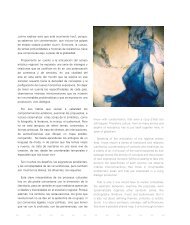yacían ensangrentados en las instalaciones carcelarias. Sesenta y ...
yacían ensangrentados en las instalaciones carcelarias. Sesenta y ...
yacían ensangrentados en las instalaciones carcelarias. Sesenta y ...
Create successful ePaper yourself
Turn your PDF publications into a flip-book with our unique Google optimized e-Paper software.
Recuerda que morirás 6.1 Remember that you will die<br />
Cu<strong>en</strong>to -sin un error, porque de la exactitud<br />
dep<strong>en</strong>de mi vida- la ar<strong>en</strong>a del desierto<br />
que comparto con otros <strong>en</strong> mi extraño té del<br />
atardecer.<br />
La ar<strong>en</strong>a del desierto que comparto con otros<br />
Un mundo para todos dividido<br />
Roberto Sosa<br />
Con una trayectoria de algunos años <strong>en</strong> el arte público,<br />
César Manzanares es uno de esos artistas hondureños<br />
que ha asumido los riesgos de realizar una obra lejos, <strong>en</strong><br />
principio, de los esquemas habituales con los que se ha<br />
solido id<strong>en</strong>tificar el arte de su país. Sali<strong>en</strong>do de los marcos<br />
de la bidim<strong>en</strong>sionalidad, y la frescura a veces forzada de<br />
paisajes bucólicos, César busca <strong>en</strong> la espontaneidad<br />
y des<strong>en</strong>fado del performance, no solo provocar a sus<br />
espectadores, sino también hacerlos partícipe de su obra<br />
y <strong>en</strong> cierta medida responsables del resultado de ésta.<br />
Ese público necesariam<strong>en</strong>te activo, que es por lo g<strong>en</strong>eral<br />
no avisado o no <strong>en</strong>tr<strong>en</strong>ado <strong>en</strong> la apreciación artística,<br />
resulta imprescindible <strong>en</strong> la consumación conceptual de<br />
su trabajo, y de paso desc<strong>en</strong>tra e incluso cuestiona la<br />
frágil estructura de la institución arte <strong>en</strong> su país.<br />
Realizando una suerte de re-lectura lúdica de la<br />
Historia, y la consigui<strong>en</strong>te re-interpretación de la misma,<br />
César Manzanares juega <strong>en</strong> su obra Mem<strong>en</strong>to mori, con<br />
un peculiar f<strong>en</strong>óm<strong>en</strong>o como la relación vida-muerte, que<br />
muchas veces <strong>en</strong> nuestras regiones vi<strong>en</strong>e acompañada<br />
de <strong>las</strong> no m<strong>en</strong>os célebres expresiones de viol<strong>en</strong>cia <strong>en</strong><br />
todas sus variantes. Mem<strong>en</strong>to mori, es una reflexión que<br />
escapa sin embargo, a los marcos estrictos de la Historia<br />
(del arte) de Honduras, para inscribirse <strong>en</strong> un discurso<br />
mucho más universal que, desde su localismo, bebe de<br />
los grandes maestros del arte internacional, al tiempo<br />
que se erige sobre <strong>las</strong> más profundas tradiciones de su<br />
región.<br />
I count –without erring, because my life<br />
Dep<strong>en</strong>ds on my accuracy—the sands of the<br />
desert<br />
That I share with others in my strange tea<br />
party at sunset.<br />
The sands of the desert that I share with<br />
others<br />
A world for all divided<br />
Roberto Sosa<br />
With a trajectory of only a few years in public art, César<br />
Manzanares is one of those Honduran artists who has<br />
assumed the risks of creating an oeuvre far removed,<br />
in principle, of the usual stereotypes with which the art<br />
of his country has be<strong>en</strong> id<strong>en</strong>tified. Departing from the<br />
frame of bi-dim<strong>en</strong>sionality, and the sometimes forced<br />
freshness of bucolic landscapes, the spontaneity and<br />
ease of César’s performances not only try to provoke his<br />
audi<strong>en</strong>ce, but also to make them participate in them and,<br />
to some ext<strong>en</strong>t, take responsibility of the results. This<br />
necessarily active audi<strong>en</strong>ce, g<strong>en</strong>erally without expertise<br />
or ev<strong>en</strong> training in artistic appreciation, becomes<br />
indisp<strong>en</strong>sable in the conceptual consummation of his<br />
work, which also unsteadies and ev<strong>en</strong> calls into question<br />
the fragile structure of artistic institutions in his country.<br />
Through a sort of ludic re-reading of History, and its<br />
subsequ<strong>en</strong>t reinterpretation, César Manzanares toys in<br />
his work Mem<strong>en</strong>to mori with a peculiar ph<strong>en</strong>om<strong>en</strong>on,<br />
the relationship betwe<strong>en</strong> life and death, which in our<br />
countries is very oft<strong>en</strong> accompanied by the infamous<br />
expression of viol<strong>en</strong>ce in all its variants. Mem<strong>en</strong>to<br />
mori is a reflection that however goes beyond the strict<br />
borders of Honduran history (and Honduran art) to insert<br />
itself in a much more universal narrative, which from its<br />
localism, feeds on the great masters of international art<br />
at the same time that builds upon the deepest traditions<br />
of his region.<br />
30 32 34 36 38 40 42 44 46 48 50 52 54 56



